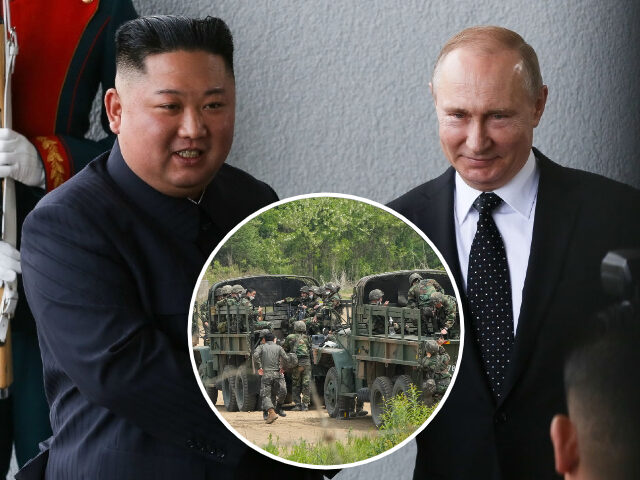A Russian government network claimed this weekend that unspecified “reports” indicated that North Korea was willing to send as many as 100,000 soldiers into the Ukrainian war theater to support Moscow.
“There are reports that 100,000 North Korean volunteers are prepared to come and take part in the conflict,” Igor Korotchenko, described by the New York Post as a “defense pundit,” reportedly said on Russia’s Channel One, without clarifying what reports he was referring to or if officials belonging to either government had corroborated the reports.
The rumor, which neither the communist North Korean government nor its propaganda arms have addressed at press time, follows a month in which dictator Kim Jong-un has sought an increasingly high-profile role in the Russian invasion of Ukraine in support of the aggressor, most conspicuously cementing ties with Russian separatists in the country. North Korea followed Russia and Syria last month in recognizing pro-Russian separatist groups in Ukraine’s Donbass region as countries, prompting Kyiv to cut diplomatic ties with Pyongyang. North Korea has also amplified unsubstantiated claims out of Moscow that the Chinese coronavirus may have originated in alleged American laboratories in Ukraine; in reality, no cases of Chinese coronavirus have been documented prior to the first cases identified in Wuhan, China, in late 2019.
Korotchenko – speaking on Russian state television, and thus likely amplifying the opinions of the government – reportedly said on the Channel One broadcast that Moscow should welcome North Korean participation in the war.
“If North Korea expresses a desire to meet its international duty to fight against Ukrainian fascism, we should let them,” the Post translated his remarks as saying.
The report did not specify what kind of “volunteers” North Korea was considering sending to Ukraine, though hinting at taking part in “the conflict” suggests that the “volunteer” aid would be of a military nature. A report published on Friday by Daily NK, which covers news from North Korea, indicated separately that Pyongyang was considering sending manual labor to the Donbass region to help the separatists rebuild, which appears to be a different effort from the one mentioned on Russian state media.
“North Korea’s leadership seems eager to send their compatriots to Ukrainian territory while the war is still raging, multiple sources told Daily NK,” the outlet claimed. “A source in Russia told Daily NK on July 25 that the North Korean authorities had instructed companies operating in Russia to get ready to send workers to the war zone.”
Daily NK estimated, citing its unnamed sources, that “more than a thousand workers who are already in Russia” could be relocated to Donetsk and Luhansk. It quoted a source listing multiple North Korean government agencies preparing to assign workers to deploy to Ukraine, but none of them within of the armed forces or the defense infrastructure.
The outlet noted that rumors suggested that North Koreans were “reluctant” to deploy to Ukraine because of fears that the war zone was too dangerous and the Russian government did not offer adequate compensation.
Russian strongman Vladimir Putin invaded Ukraine in 2014, annexing its Crimean peninsula and strengthening a separatist resistance in the eastern Donbass region that has spawned the “Donetsk People’s Republic” and “Luhansk People’s Republic,” which only Russia, Syria, and North Korea recognize as countries. In February, Putin declared in a nationally televised speech that Ukraine “was completely created by Russia” and not a real state; in the same speech, Putin announced the recognition of Donetsk and Luhansk as countries and a Russian military operation to eradicate the Ukrainian government. The Russian government regularly refers to Ukrainian President Volodymyr Zelensky, who is Jewish, and his administration as “Nazis” and “fascists.”
Russia is one of North Korea’s top allies, second only to neighboring China, which is currently technically still embroiled in the nearly century-old unresolved Korean War. Russia remains the only country other than China and Singapore that dictator Kim Jong-un has visited since succeeding father Kim Jong-il as the nation’s tyrant. Kim and Putin exchanged ceremonial swords and enjoyed a lavish state dinner during Kim’s visit to Vladivostok, Russia, in 2019.
While North Korean media has yet to address the possibility of North Korean “volunteers” traveling to the Ukraine war front, the state newspaper Rodong Sinmun boasted of an “online seminar” celebrating Kim Jong-il in Russia on Sunday as a sign of solidarity between the two countries.
“The respected Comrade Kim Jong Un had a meaningful meeting and significant talks with President Putin in Vladivostok City in April 25, 2019,” a participant at the seminar was quoted as saying. “This ushered in a new heyday in developing relations between Russia and the DPRK [North Korea] and was an event of great significance in ensuring durable peace and security of the Korean peninsula.”
North Korea has a long history of deploying military assets, selling weapons, and otherwise participating in international conflicts. The country’s most prominent engagements of the kind have occurred in Africa, where the Kim family cemented ties throughout the decades with tyrants like Zimbabwe’s Robert Mugabe and Uganda’s Idi Amin.
“Three decades after the end of the Cold War, North Korea maintains an economic, diplomatic and security footprint in Africa,” the North Korean news site 38 North detailed last year. “North Korea’s enduring appeal as a partner with these countries can be explained by its low-cost arms transfers, African efforts to develop indigenous defense infrastructures, North Korean dispatch of guest workers to meet labor needs and the use of ideologically based soft power.”
In addition to arms and soldiers, North Korea has also found a market in Africa for statues and other large monuments.

COMMENTS
Please let us know if you're having issues with commenting.